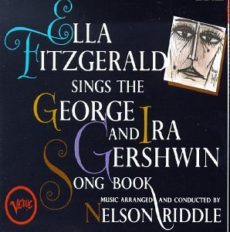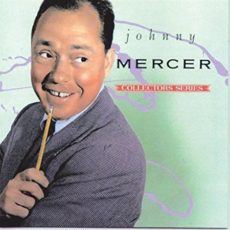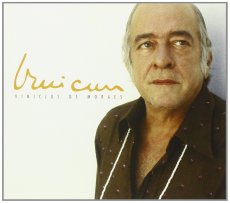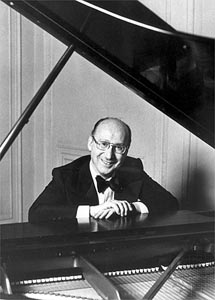
Daily Dose Of Jazz…
Ira Gershwin was born on December 6, 1896 in New York City, the oldest of four children of Moishe and Rose Gershovitz, who were Russian Jews, born in St Petersburg, and emigrated to the US in 1891. Shy in his youth, Ira spent much of his time at home reading, but from grammar school through college he played a prominent part in several school newspapers and magazines. Graduating in 1914 from Townsend Harris High School where he had met Yip Harburg, they enjoyed a lifelong friendship and a love of Gilbert and Sullivan. He went on to attend City College of New York but dropped out.
His brother George began composing and plugging in Tin Pan Alley from the age of 18, while Ira worked as a cashier in his father’s Turkish baths. It was not until 1921 that Ira became involved in the music business when Alex Aarons signed Ira to write the songs for his next show, Two Little Girls in Blue. Not to appear to trade off George’s growing reputation, he wrote under the pseudonym Arthur Francis, after his youngest two siblings. His lyrics were well received, allowing him successfully to enter the show-business world with just one show.
Later the same year, the Gershwins collaborated for the first time on a score of A Dangerous Maid, which played in Atlantic City and on tour. 1924 saw Ira officially teaming with George to write the music for what became their first Broadway hit Lady, Be Good. Once the brothers joined forces, their combined talents became one of the most influential forces in the history of American Musical Theatre. Together, they wrote the music for more than 12 shows and four films.
Their partnership continued until George’s sudden death from a brain tumor in 1937 and he waited nearly three years before writing again. Returning from this hiatus, Ira teamed up with composers Jerome Kern, Kurt Weill and Harold Arlen among others. Over the next 14 years, Ira gave his farewell to Broadway with the failure of Park Avenue in 1946. In 1947, he took 11 songs George had written but never used, added lyrics, and incorporated them into the film The Shocking Miss Pilgrim.
For the next four decades he would continue to write lyrics leaving such memorable classics as Embraceable You, I Can’t Get Started, Let’s Call the Whole Thing Off, My Ship and They Can’t Take That Away from Me, among numerous others. Lyricist Ira Gershwin passed away on August 17, 1983 at the age of 86 in Beverly Hills, California.
More Posts: lyrics

Daily Dose Of Jazz…
John Herndon Mercer was born November 18, 1909 into a prominent family Savannah, Georgia. He became known to the world simply as Johnny and liking music as a small child was exposed this parents singing, minstrels, vaudeville shows. Growing up with Black playmates and servants he gained further exposure to Black music listening to the fishermen and vendors, Black church music. Having no formal musical training he was singing in a choir by six and by eleven years old had memorized almost all of the songs he had heard and became curious about who wrote them.
Mercer’s talent was in creating the words and singing, he listened to Ma Rainey, Bessie Smith, and Louis Armstrong, and with his natural sense of rhythm easily learned to dance from Arthur Murray. He attended Woodberry Forest boys prep school where he was a member of the literary and poetry societies, and the hop committee that booked musical entertainment on campus. He became the stamp of approval on all orchestra and new productions and quickly learned the powerful effect songs had on girls.
Though headed for Princeton University as a legacy, his hopes were dashed with the Great Depression but eventually escaped Savannah and moved to New York in 1928, when he was 19. Jazz and blues, were booming in Harlem and Broadway was bursting with musicals and revues from George Gershwin, Cole Porter, and Irving Berlin. He got small acting parts, wrote lyrics, met Eddie Cantor who encouraged him and finally got a song, composed by Everett Miller, into the Garrick Gaieties in 1930. His first song was recorded by Joe Venuti and his New Yorkers.
At 20 he began hanging out with other songwriters to learn the trade, traveled to California on a lyric writing assignment for the musical Paris in the Spring, met Bing Crosby and Louis Armstrong returned to New York and got a job as staff lyricist for Miller Music for a $25-a-week draw. He would go on to win a vocal position with Paul Whiteman’s orchestra, then make his vocal recording debut with Frank Trumbauer’s Orchestra, and o apprentice with Yip Harburg on the score for Americana. But it was his chance pairing with Indiana-born Hoagy Carmichael that his fortunes improved dramatically with Lazybones, which became a hit one week after its first radio broadcast, and each receiving a large royalty check of $1250.
Mercer became a member of ASCAP and a recognized “brother” in the Tin Pan Alley fraternity alongside Irving Berlin, George Gershwin, and Cole Porter among others. As the demand for the stand alone song diminished he set his sights on Hollywood and landed a job with RKO and claiming his first big Hollywood song I’m an Old Cowhand from the Rio Grande was performed by Crosby in the film Rhythm on the Range in 1936. The demand for him as a lyricist took off and his second hit that year was Goody Goody followed by a move to Warner Brothers studio in 1937.
He would go on to write hits like Jeepers Creepers, You Must Have Been a Beautiful Baby, Day In, Day Out, Fools Rush In, One for My Baby (and One More for the Road), That Old Black Magic and Come Rain or Come Shine, Skylark, In the Cool, Cool, Cool of the Evening, as well as lyrics for the established instrumental hits Laura, Midnight Sun, Satin Doll and Autumn Leaves among others.
By the mid-1940s enjoyed a reputation as one of the premier Hollywood lyricists. With the advent of rock and roll in the 1950s and the transition of jazz into “bebop” Mercer’s natural audience and venues for his songs dwindled. He continued to write a string of hits for some MGM films, made occasional television appearances, teamed up with Henry Mancini and wrote the wrote the lyrics to Moon River, Days of Wine and Roses and Charade. He would go on to write I Wanna Be Around and Summer Wind and the lyrics for I Remember You which was the most direct expression of his feelings for the affair he had in 1941 with then 19-year old Judy Garland.
Over the course of his career Johnny would team up with Richard Whiting, Harry Warren and Johnny Mandel, have his lyrics recorded as part of Ella Fitzgerald’s Songbook series, received eighteen Oscar nominations, winning four for Best Song, founded Capitol Records, and helped establish the National Academy of Popular Music’s Songwriters Hall of Fame.
Diagnosed was an inoperable brain tumor, lyricist Johnny Mercer passed away on June 25, 1976 in Bel Air, California. Posthumously, the Songwriters Hall of Fame established the Johnny Mercer Award, he was honored with a postage stamp, received a star on the Hollywood Walk Of Fame, given tribute in the book and film Midnight in the Garden of Good and Evil, a statue was unveiled in Ellis Square in Savannah, and The Johnny Mercer Collections, including his papers and memorabilia, are preserved in the library of Georgia State University in Atlanta, GA.
![]()
More Posts: lyrics,songwriter,vocal

Daily Dose Of Jazz…
Vinicius de Moraes was born Marcus Vinicius de Moraes on October 19, 1913 in Rio de Janiero, Brasil. As a child he was exposed to various musicians and composers and in high school he was writing his first compositions. He went on to graduate college at twenty and published two books of poetry.
Over the next several years he held a variety of banking, government and diplomatic positions while still writing and publishing his poetry. But it wasn’t until the ‘50s that he moved into the realm of pop culture. He studied film festival management, wrote his first samba, contributed lyrics to several classical pieces and in 1956 Vinicius staged his musical play Orfeu da Conceicao that would later become Orfeu Negro or Black Orpheus and win an Academy Award for Best For Language Film in 1959, a British Academy Award and the French Palm d’Or at Cannes.
Collaborating with Antonio Carlos Jobim, Moraes was at the fore when the bossa nova movement began with the release of Elizete Cardoso’s album Cancao do Amor Demais that consisted of the pairs music and a then unknown Joao Gilberto. They went on to compose Garota de Ipanema, Insensitez and Chega de Saudade. Vinicius’ songs would go on to be included in another Cannes winner Un Homme et une Femme (A Man and A Woman) in 1966.
In the 1960s and 1970s, Vinicius continued collaborating with many renowned Brazilian singers and musicians, in particular with Baden Powell venturing into Afro-Brazilian influences that came to be known as collectively as Afro-Sambas. A known bohemian and diplomat, Vinicius also had a problem with alcohol that ultimately had him drummed out of the diplomatic corps by the military regime. But with his new partner, guitarist and singer Toquinho, he continued to realize success on both music and literary landscapes releasing several popular and influential albums.
Vinicius de Moraes, composer, playwright and diplomat nicknamed O Poetinha (The Little Poet), passed away on July 9, 1980 in Rio de Janiero after a long spell of poor health. Hundreds of jazz musicians and performers worldwide have recorded more than 400 of his songs. In 2006 he was reinstated into the diplomatic corps and in 2010 was posthumously promoted to the post of Ambassador by the Brazilian Chamber of Deputies.

Daily Dose Of Jazz…
Lorraine Feather was born Billie Lorraine Feather in Manhattan on September 10, 1948 to jazz writer Leonard and Jane, a big band singer. Named after her godmother Billie Holiday, she began using her middle name in grade school.
Lorraine began working in television as a lyricist in 1992 and has received seven Emmy nominations. Her lyrics for children include work for ABC, PBS, Disney and MGM films; with composer Mark Watters wrote for Jessye Norman’s 1996 Olympic performance, and with Larry Grossman composed for Julie Andrews.
Feather’s work has been heard on numerous records covered extensively by artists such as Phyllis Hyman, Kenny Rankin, Patti Austin, Diane Schuur and Cleo Laine. Many of her own solo projects have featured contemporary lyrics to formerly instrumental pieces written by Duke Ellington, Fats Waller and other pre-bop composers. Feather’s recordings have received glowing reviews in every major jazz magazine including Down Beat and Jazz Times.
Loraine has gone on to lyric theatrical work, musical and the American Opera Projects presented excerpts of her work. Her latest release, titled “Attachments” has her penning twelve new sets of lyrics with musicians such as Dave Grusin, Joey Calderazzo, Russell Ferrante, Shelly Berg and Eddie Arkin composing the music. She continues to write, record and perform.

Daily Dose Of Jazz…
Sammy Cahn was born Samuel Cohen on June 18, 1913 in the lower East side of New York City and began his music career studying the violin. After only three lessons at thirteen years he joined a small Dixieland band called Pals of Harmony, touring the Catskill Mountains summer resorts and play private parties. By16 he was writing his first lyric “Like Niagara Falls, I’m Falling For You” and his songs were being sung on the vaudeville stage by Jack Osterman.
Much of Cahn’s early work was written in partnership with Saul Chaplin writing witty special material for Warner Brothers musical short subjects. They continued to work with then up-and-comers Milton Berle, Danny Kaye, Phil Silvers and Bob Hope. Cahn soon began a partnership with Lou Levy and writing for Jimmie Lunceford, Glen Gray, Tommy Dorsey and eventually teaming with Jimmy Van Heusen and writing for Frank Sinatra.
His impressive career spawned lyrics for Until The Real Thing Comes Along, Love and Marriage, Three Coins In The fountain, I Fall In Love Too Easily, All The Way, I’ll Never Stop Loving You, The Second Time Around and All My Tomorrows among many more.
Cahn was inducted into the Songwriters Hall Of Fame, nominated for 23 Academy Awards, five Golden Globes and an Emmy. He received four Oscars, and had the Sammy Awards created in his honor for movie songs and scores.
Sammy Cahn, best known for his romantic lyrics for film, Broadway and stand alone songs, many of which have become jazz standards, passed away on January 15, 1993 at age 79 in Los Angeles California.
More Posts: lyrics




